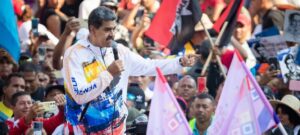 Under chaotic and controversial circumstances, Venezuela’s government has scheduled the presidential election for July. President Maduro is running again – already ensuring that the opposition likely has no chance.
Under chaotic and controversial circumstances, Venezuela’s government has scheduled the presidential election for July. President Maduro is running again – already ensuring that the opposition likely has no chance.
Has the Election Already Been Decided?
Under chaotic and controversial circumstances, Venezuela’s government has scheduled the presidential election for July. President Maduro is running again – already ensuring that the opposition likely has no chance.
13 candidates have registered for the presidential elections on July 28 in Venezuela to challenge the authoritarian ruler Nicolás Maduro. The names were read out shortly after the registration deadline earlier this week by the Electoral Council.
However, behind the scenes, chaos reigns. The largest opposition coalition – Mesa de la Unidad Democrática (MUD) – failed to enroll its desired candidate. The leading candidate, Maria Corina Machado, was banned from holding public office for 15 years due to alleged irregularities during her time as a lawmaker.
Initially, the 80-year-old Corina Yoris, a renowned university professor, was supposed to run on her behalf. However, she too was unable to complete her registration with the electoral authorities due to a computer malfunction.
Opposition leads in polls
At the last minute, the opposition coalition has now nominated the political scientist González Urrutia. He has stepped in to serve as a temporary candidate, as parties can replace their candidates until April 20. Opposition leader Machado remains defiant: “We will not be silenced.”
Machado had the potential to challenge President Maduro for power. In recent weeks and months, she managed to inspire Venezuelans, filling venues and campaign events. She consistently led in various polls. Observers suggest that Yoris would have benefited from her popularity.
According to the latest survey by the Venezuelan polling institute Datanalisis in early March, only 15.2 percent of respondents identified with the governing party, while 35.7 percent supported the opposition. Maduro appears to feel threatened, allowing only candidates who pose no danger to him.
Previous elections were not recognized
After the death of his predecessor Hugo Chávez, Maduro was initially sworn in as interim president in March 2013. He was then elected as head of state in a closely contested early election.
In 2018, he confirmed his position in a controversial election. Due to allegations of manipulation, the opposition and dozens of countries, including the US and EU states, did not recognize the result.
Massive repression
Ahead of the upcoming July election, Maduro’s government has been cracking down harder on opposition figures. Last week, close campaign workers of Machado were arrested. Additionally, arrest warrants were issued for seven more individuals on her team, according to the Attorney General’s Office, on charges of conspiracy to destabilize the country.
Six opposition figures sought protection at the residence of the Argentine embassy in Caracas. The Argentine Foreign Ministry reported that power to the building was subsequently cut off.
In its latest report, the United Nations mission in Venezuela harshly criticized the authorities. Spokesperson Martha Valiñas stated that there are two forms of repression: silencing the voices of the opposition at all costs and creating a climate of fear and intimidation that restricts the free exercise of fundamental rights.
Hope for change
Leftist governments in Colombia and Brazil have also distanced themselves from Maduro’s socialist regime. They are calling for the implementation of the agreement from Barbados, where representatives of the government and the opposition agreed in October on free and transparent elections.
Amid repression, political and economic crises, violence, and corruption, over eight million Venezuelans have left their homeland, many with the goal of reaching the United States.
Many who remain hope to vote and facilitate a democratic transition. Venezuelan journalist Liza López stated, “A large part of the population hopes for an agreement, a consensus, a candidate who represents the entire political spectrum within the opposition – whether they lean right, center, or center-left.” The focus is on a peaceful transition to improve the quality of life for all Venezuelans.

